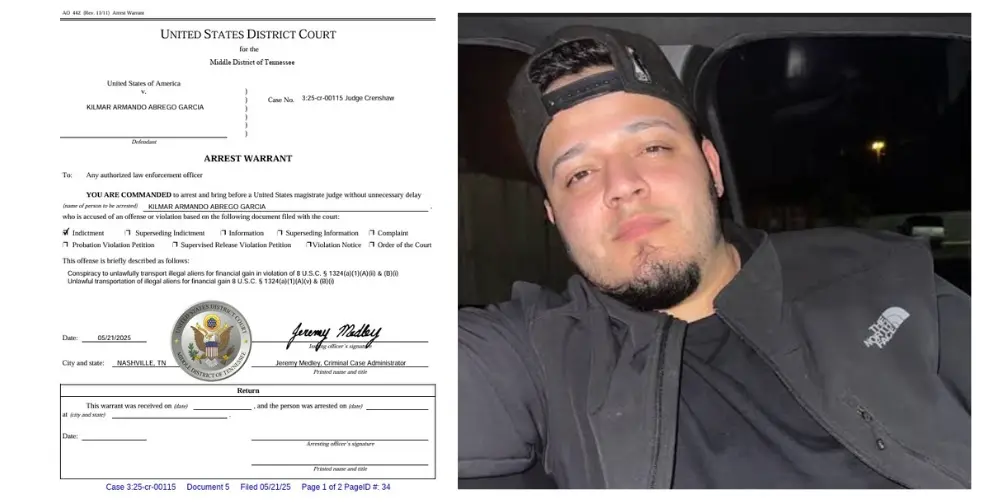The Shadow of Retreat – How the US Tries to Save Face in the Case of Kilmar Abrego Garcia
It begins with a return flight. Not voluntary, not hopeful – but as the result of an institutional breakdown that reaches far beyond the borders of immigration policy. Kilmar Abrego Garcia, whose deportation to El Salvador on March 15, 2025, violated an existing US court order, has returned to the United States. But not as a free man – rather, as a defendant. The charge: human smuggling. The true reason: political damage control. What the US government portrayed on June 6 as a “major blow against a criminal network” appears on closer inspection to be a legal emergency brake, pulled out of fear of losing control. Few cases have so profoundly shaken the new deportation policy under President Donald Trump as that of Abrego Garcia – a construction worker from Maryland who had lived in the US without papers since 2011, but was under special protection. Based on a 2019 court ruling, he could not lawfully be deported, and yet he was flown out – overnight – to a maximum-security prison called CECOT, where alleged terrorists and gang leaders are held. For weeks, US authorities refused to bring him back – until the Supreme Court made it clear on May 3: this deportation was not only wrong, it was unconstitutional.

Instead of correcting this injustice, the Justice Department is now constructing an indictment – based on an alleged human smuggling operation going back a decade. A grand jury in Tennessee accuses Abrego Garcia of conducting “over 100 trips” as part of a network that transported migrants – including children and alleged gang members – across the US. He was not charged in connection with the deadly truck accident in Mexico in 2021 that killed 50 people. Still, US Attorney General Pam Bondi said at a press briefing, “He wasn’t a subcontractor. It was his full-time job – smuggling people, women, children.” As evidence, alleged statements from co-conspirators are cited – without solid documentation, without direct proof. The case remains sealed.


And yet, Bondi declared, “This is what American justice looks like.” The return flight, she claimed, was not a reaction to the Supreme Court – but the result of an extradition request to El Salvador, which President Bukele personally approved. The administration expressed gratitude. What sounds like a geopolitical success story is, in truth, an admission of political vulnerability. The White House reaction was no less polemical: Trump’s spokeswoman Karoline Leavitt declared in a bizarre tirade that Abrego Garcia was an “illegal alien terrorist, gang member, and human trafficker” who had “spent his entire life abusing innocent people.” Democratic senators like Chris Van Hollen and Angela Alsobrooks, who had advocated for Abrego Garcia’s return, should “immediately apologize to the victims.” It is a rhetoric that says more about the state of this administration than it does about the case.

Senator Van Hollen responded with his usual sobriety: “This is not about the man – it’s about his constitutional rights, and the rights of all people in this country.” Angela Alsobrooks made it clear as well: “Even the Supreme Court demanded that the President follow the law.” But what does law mean when the political narrative takes precedence? Simon Sandoval-Moshenberg, Kilmar Abrego Garcia’s attorney, called it a “clear abuse of power”: “This administration – instead of simply admitting their mistake – resorts to the most preposterous charges imaginable just to save face.” He announced that he would fight the indictment with full force. “Abrego Garcia is one of the first – if not the first – person to be released from the CECOT terror prison. It will be very interesting to hear what he has to say about how he was treated there by Salvadoran authorities.”

That the case is politically motivated is not just the opinion of the defense. As we have now learned, Ben Schrader – until recently the head of the criminal division at the US Attorney’s Office in Nashville – abruptly resigned last week in protest over the politicization of the case. According to multiple sources, Schrader made it clear that he saw not a case in Abrego Garcia, but a tool. And a tool was something he refused to prosecute. In legal history, this is called making an example – not to protect society, but to preserve one’s own facade. What is happening here is not the defense of law and order – but the weaponization of criminal law for political self-preservation. A shabby attempt to turn failure into threat.

The case of Abrego Garcia is by now far more than an isolated incident. It is a symbol of the moral collapse of an administration that would rather sacrifice a person than admit a mistake. And it is a warning to anyone who still believes that the rule of law in the United States is a universal good. Because what remains of a constitutional state when its rulings are ignored and replaced by publicity-friendly indictments? Nothing but a shadow – and a man who bears it.

Und zusätzlich ist Pame Bondi eine Scientology Anhängerin, welche von dieser Sekte in Florida finanziell unterstützt wurde. Wie auch Kenedy jr. Verbindung zu dieser Sekte hat. MAGA ist in dieser Regierung nur der Tropfen auf den heissen Stein.
danke dir, den club hatte ich mal bis in die osa und straflager rein recherchiert und eine doku mit anderen kollegen zusammen gemacht